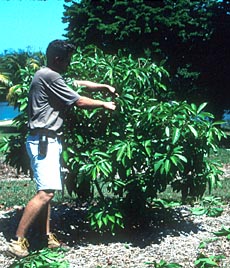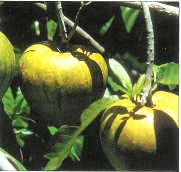From Fairchild
Tropical Botanic Garden
Virtual Herbarium Database
The Maya Fruit:
Canistel
Pouteria
campechiana
Mayan youths gather mature, green canistel
fruit from dense evergreen trees planted near their homes. The fruit
are placed in the cooled ashes of the fire and left to ripen to a
golden yellow. In the Yucatan the canistel remains a common home garden
fruit. Its flesh retains a bright yellow color when heated or frozen,
making it attractive in natural sorbets and baked products.

The canistel, Pouteria
campechiana, is a member of the Sapotaceae (mamey sapote
family). It is an evergreen tree native to Central America. The
canistel is highly adaptable in Florida where it is grown in some home
gardens. The tree is easy to grow with minimal care because it is quite
wind resistant, and tolerates sandy or limestone soils.

Canistel or “egg fruit” has similar characteristics
to cooked pumpkin. It is delicious when mixed with milk products,
because it doesn’t sour the milk like many fruits do. It has
a consistency of boiled egg-yolk. The yellow flesh is relatively firm
and mealy with a few fibers. The fruit matures from November through
March. Canistel can be eaten fresh or used in pies, milkshakes, pudding
and bread. The fruit are picked when mature (yellow-color) and can be
stored at room temperature for 3 to 10 days. If you wish to store the
flesh you can freeze it for up to 6 months. Before freezing, mix the
flesh with sugar. Canistel are rich in vitamin C, calcium, minerals and
phosphorous; fat-low.

One cup fresh
pulp contains:
•139 calories
•29 g protein
•0.13 g fat
•37 g carbohydrates
•0.10 g fiber
•27 mg calcium
•37 mg phosphorous
•58 mg vitamin C
'Bruce,' selected in South Florida, will provide ample harvests of 3/4
pound fruit.
Canistel
Recipes
Back
to
Canistel
Page
|
Copyright © 2007 Virtual Herbarium - All rights reserved
|